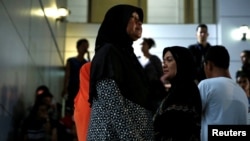Thailand's Prime Minister Prayut Chan-ocha has ordered police to set up a special committee to find and probe government officials abetting the country's human trafficking rings, after a COVID-19 outbreak he has blamed on illegal migrants.
But rights groups doubt the campaign will do much to break the links that smuggling networks have forged with corrupt local officials over many years and consider the effort more show than substance.
Prayut called for the committee at a meeting of the government's Defense Council last week, said Lt. Gen. Kongcheep Tantrawanit, a spokesman for the Ministry of Defense who was there.
"We believe that some officials [are] involved. We believe, and we will find out," he told VOA.
The order came less than a week after the outbreak of the worst wave of COVID-19 infections Thailand has seen since the pandemic started. The flashpoint was a shrimp market teeming with migrant workers from neighboring Myanmar, which is wrestling with one of the heaviest coronavirus caseloads in Southeast Asia.
'A drop in the bucket'
Thailand had managed to contain the pandemic, with only 4,297 confirmed cases as of December 17, when health care workers detected the first COVID-19 case at the shrimp market, a few dozen kilometers west of the capital, Bangkok. Authorities have found another 2,143 cases since then across the country, most of them stemming from the market. Although a Thai woman was the first positive case confirmed there, Prayut has blamed illegal migrants from Myanmar for seeding the outbreak, without offering evidence.
Government spokeswoman Ratchada Thanadirek said that working theory nonetheless sparked the prime minister's call to purge any officials complicit in smuggling migrants into Thailand.
"We will go after the government officers, the police officers, whoever [is] involved in this violation of law," she said. "It's going to be a long-term effort. It has started, but since this incident happened, then more effort must have to be put into this."
Authorities arrested a local politician earlier this month for allegedly trafficking migrants from Myanmar into Thailand's notoriously abusive long-haul fishing industry in the southern province of Nakhon Si Thammarat.
The Thai government claims it convicted 14 officials on trafficking-related charges in 2019. But given the volume of that traffic, "it's really a drop in the bucket," said Phil Robertson, the Bangkok-based deputy Asia director for Human Rights Watch.
The United Nations estimates that up to 5 million migrants may be working in Thailand, more than 2-in-5 of them illegally.
In its 2020 global Trafficking in Persons report, the U.S. State Department said corruption continued to riddle and sap Thailand's efforts to sever the networks funneling them in, from border guards taking bribes to police officers sitting on evidence to shield smugglers and employers from prosecution.
'Someone to blame'
Robertson does not expect the new committee to change that in any big way, even with the new health risks unregulated border crossings pose in the era of the novel coronavirus.
"I would be surprised if there's going to be any significant results, in part because the system of corruption between employers and corrupt officials, the sort of nexus of benefits from exploitation of migrant workers is so deep and so intense and so historically grounded that ... just another working committee and announcement by the prime minister is not going to do anything," he said.
"What we'll see is a couple high-profile cases, a couple of scalps to be shown to the prime minister to say, hey, we're doing our job," he added. "But I don't expect any sort of change systematically."
Sunwanee Dolah, who consults for several local rights groups on human trafficking, said she has seen too many superficial police probes into smuggling rings for news of a new committee to raise her hopes for real change.
"The investigation [is] cut off when they just find someone who can take the blame, but not getting into the real person who [is] behind the whole process," she said.
"If the committee is actually set up [to] look for specifically the government officials who are behind [it], I don't think that it would help because the big ones will not be caught anyway," she said. "It would just be another process for them to just find someone to blame."
'A complex problem'
Rights groups also say it's just as important — if not more so — to empower the migrant workers themselves through labor and justice reform so they don't turn to smugglers or fall victim to traffickers in the first place.
They say the government should let foreign workers form their own unions and ditch abusive employers without the need for their bosses' consent. Courts should make it easier for them to file complaints by lowering legal fees and offering to translate, said Roisai Wongsuban, an adviser to the Migrant Working Group, a network of local non-government organizations.
"If the justice system is still not friendly or not able to accommodate the needs of the most vulnerable people, I see no point of tackling corruption," she said.
"It's a complex problem, so by saying, ‘oh, we will find a bad guy and we will tackle it,’ it's too simple."
In its 2020 trafficking report, the U.S. State Department said Thailand had done more in 2019 than the year before to tackle trafficking overall, despite the entrenched corruption. But several rights groups have challenged the claim and say the numbers don't bear that out.
Thailand reported investigating and prosecuting hundreds of trafficking cases in 2019 and winning 304 convictions. But its numbers on all three counts were down year on year.






